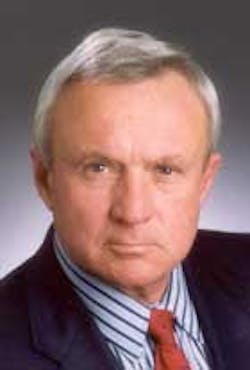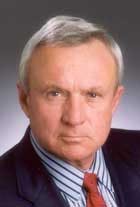Good timing, buyout helped former US Gas Transportation avoid credit crunch last year
Kate Thomas
OGJ Online Staff
Much of this year has been a lousy market for natural gas, but 2001 will be a robust year for the Texas gas marketing unit of Aquila Inc., formerly U.S. Gas Transportation Inc., thanks to good timing and a buyout.
Nanci Mackenzie, energy entrepreneur and president of newly named Aquila Dallas Gas Marketing LLP, estimates this year's revenue will be $2 billion, up from $1.2 billion in 2000, the year Aquila bought USGT, and $500 million in 1999.
The Texas arm of Aquila is moving an average 1.5 bcfd, triple the amount it transported before the buyout by Aquila, an 80% owned affiliate of UtiliCorp United Inc., a Kansas City, Mo., utility which reported $10.4 billion in sales last year. Gross margins of its newly acquired Texas business unit surpassed 2000's goal and have already topped the 2001 plan, says UtiliCorp.
Credit was the key to growth, says Mackenzie, and in retrospect, the timing of the buyout couldn't have been better. USGT had access to Aquila's credit facilities during an unprecedented rise in gas prices. Mackenzie and her husband Len, executive vice-president, decided 2 years ago the 14-year-old company had grown as much as it could without access to more capital, plus they were competing with companies who could offer employees a bigger benefits package.
"We were personally guaranteed and all our assets were in the corporation," says Nanci Mackenzie. "We knew we had great controls and a great CFO. The time just seemed right."
After deliberating for 7 months, the Mackenzies made a deal with Aquila in March 2000, just as gas prices began to take off. The Mackenzies had done business with Aquila, which was active in the Midwest and was beginning to build a Texas presence, in marketing and gas storage. But Aquila wasn't well known in the West, USGT's stronghold.
In retrospect, their timing made them look "brilliant," Mackenzie says. Gas prices were a relatively modest $2.40/Mcf in March. By June, it was clear they were in a runaway market. Prices had jumped to $6/Mcf and by December prices touched an unprecedented $30/Mcf.
Mackenzie says the company could have handled a third of the increase, but by fall they would have been forced to look for an outside investor, if the company had still been independent. Instead, as a division of Aquila, they were able to expand. Mackenzie says big customers who limited the amount of business they would do with the company prior to the acquisition now feel comfortable it can handle more volume.
As USGT, the company built a reputation for delivering "swing" gas when, where, and how customers needed it 24 hr/day. Its customers were primarily large industrial users and utilities mostly in western states. "We have never failed to perform on a peaking contract," Mackenzie says.
Mackenzie, who's taken inspiration for employee compensation from Dallas cosmetic queen Mary Kay and customer service from Southwest Airlines' founder Herb Kelleher, got her start in the industry as a gasoline trader and marketer in 1973 in Arlington, Tex.
She sold her first barrel of crude for $3.25 at a time diesel fuel was wholesaling for 19¢/gal and retailing for 20-30¢/gal. In 1973 she cofounded Lucky Lady Oil Co., putting gasoline pumps at convenience stores. The company had grown to some 30 locations in the Dallas-Fort Worth area when Mackenzie sold her interest in 1982.
After a brief tour with the US Commerce Department in Washington, DC, to "see how Washington works" Mackenzie moved back to Texas, where she went to work for syndicator Lehndoff Inc. as an oil and gas properties agent.
Swing gas specialist
She shopped for oil and gas properties for Lehndoff for 4 years. It was a dream job. "All I had to do was make deals and I love to make deals," she recalls. But the 1986 oil price crash brought the buying spree to a screeching halt. After prices fell to $8/bbl from about $22/bbl, Lehndoff began divesting its oil and gas portfolio and Mackenzie became president of USGT, which had been formed to market the production.
"We became gas marketers by default," she says. At about the same time, federal regulators required interstate pipelines to separate their merchant and scheduling functions. "Somebody had to step in and perform the merchant function," Mackenzie says. "I had dealings with producers all these years."
After surveying the market, USGT found its niche in "swing" gas. Big companies didn't want to trade daily gas because the margins were so thin. "Nobody wanted to compensate traders for scheduling swing gas and unscheduling swing gas," she says. There didn't seem to be enough money in it at the time.
Mackenzie soon developed a reputation for pushing the envelope when it came to new products. When a utility in New Mexico complained of the 48-hr advance notice pipelines needed for delivery of peak use gas, USGT came up with a 4-hr deal. That was in 1994.
"We have had a contract with them ever since. They have called us in the middle of the night for all these years. At first it [the service] was not even in the tariffs," Mackenzie says. It has since been expanded to respond on even shorter notice.
In 1991, the Mackenzies bought out the other USGT partners. Len, formerly CEO of Northern Telecom Inc.'s system division in Dallas and president of General Automation Inc., Irvine, Calif., joined the company full time in 1993, improving managerial at the organization.
"I was trading every day," says Nanci, in addition to running the company. A stickler for personal service, Len keeps the company toeing the line. Phones are manned 24 hr/day. The company mantra became "one number, any time" after a large rival sent out a fax listing the names and multiple telephone numbers for all its traders. Aquila/Dallas traders also know how to schedule their own deals. Making it easy to do business keeps customers coming back, Len says.
Nanci is no longer on the trading desk, but says she keeps a close eye on the gas market. She anticipates various structured products, including long-term sales, will help smooth out forward gas prices. The daily cash market is a different beast and "will always stay volatile because it reacts to weather," she says. With the number of gas-fired electric generating peaking units coming on line, volatility could rise.
Contact [email protected]

